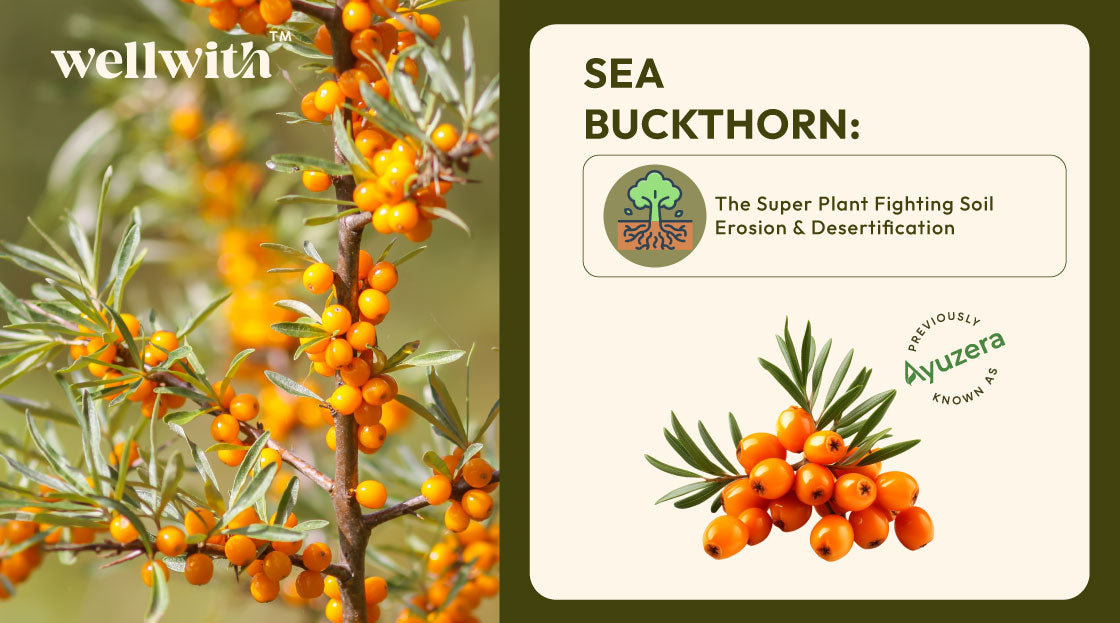Sea buckthorn is packed with antioxidants, vitamins, and healthy fats that work together to protect the body from damage caused by free radicals, which are linked to cancer development. Researchers have found that certain compounds in sea buckthorn can slow down the growth of cancer cells and even trigger their natural death.
In addition, sea buckthorn may also help improve the body’s immune response, making it easier to fight off cancer and reduce side effects from treatments like chemotherapy. While most of the research on sea buckthorn in cancer is still in the early stages, these findings are promising and suggest that sea buckthorn could be a valuable natural addition to cancer care in the future.
In this content, sea buckthorn is shown to have multiple promising effects against cancer, including slowing cancer cell growth, triggering their death, and boosting the immune system.
What Makes SeaBuckthorn Special?
Sea Buckthorn is special because it is packed with effective nutrients that help protect and heal your body. It contains a unique mix of antioxidants, vitamins like A, C, and E, B, amino acids, organic acids, phytosterols, flavonoids, healthy fats (including rare omega-7), and plant compounds that work together to support your heart, skin, immune system, and more. These natural ingredients help in fighting inflammation, reducing damage from harmful molecules called free radicals, and promoting overall health in many ways, making sea buckthorn a valuable natural remedy for many needs.
How Do Sea Buckthorn’s Properties Work Against Cancer?
Sea buckthorn promotes cellular suicide, a process that helps eliminate damaged or cancerous cells naturally. Therefore, sea buckthorn’s properties work against cancer in several important ways:
1. Slowing Cancer Cell Growth
Certain compounds in sea buckthorn, such as flavonoids and procyanidins, can slow down the growth of cancer and the spread of cancer cells by interfering with their ability to multiply.
2. Inducing Apoptosis (Programmed Cell Death)
Sea buckthorn promotes apoptosis, which is a natural process where damaged or harmful cells crumble. This helps to remove cancer cells from your body.
3. Protecting Healthy Cells
The antioxidants in sea buckthorn reduce oxidative stress and protect normal cells from DNA damage that can lead to cancer.
4. Stopping Cell Cycle Progression
Some components of sea buckthorn can stop cancer cells from progressing through their growth cycle, effectively halting their reproduction.
5. Boosting Immune Function
Sea buckthorn supports the immune system, enhancing the body’s ability to detect and attack cancer cells.
References/Latest Studies Of sea buckthorn’s anti-cancer effects
Here are some latest studies of sea buckthorn’s anti-cancer effects, which can help you fight against cancer:
-
Sea buckthorn, a traditional Chinese medicine, promotes apoptosis, which is a process of programmed cell death in cancer cells, helping remove them naturally.
- Sea buckthorn contains powerful antioxidants and phenolic compounds that protect your cells from damage and genetic changes linked to cancer.
- Latest studies show by Frontiers Nutrition that sea buckthorn oils and juices can reduce tumor size and improve immune system response.
- Sea buckthorn may help decrease the side effects of chemotherapy and radiation by restoring organ function and boosting your appetite.
- Extracts from sea buckthorn berries and seeds inhibit the growth and multiplication of various cancer cells, such as breast, prostate, liver, and leukemia or blood cancer.
How Sea Buckthorn Helps Treat Different Types Of Cancer?
Sea buckthorn helps in treating different types of cancer in given ways:
- It slows down the growth of cancer cells in your breast, prostate, liver, lung, and colon cancers.
- Sea buckthorn leads to the secure damage of cancer cells to die naturally, and this process is called apoptosis.
- It protects healthy cells from damage caused by harmful molecules.
- Sea buckthorn boosts the immune system, helping your body fight against cancer better.
- Sea buckthorn may reduce the side effects of cancer treatments like chemotherapy and radiation.
- Research mostly comes from labs and the latest studies, showing promise but needing more human trials for confirmation.
What Key Bioactive Compounds In Sea Buckthorn Treat Cancer?
Here are some key bioactive compounds in sea buckthorn that help treat cancer:
- Flavonoids: These include quercetin, kaempferol, and isorhamnetin, which protect cells from damage, slow cancer cell growth, and promote cancer cell death.
- Phenolic compounds: Powerful antioxidants that reduce oxidative stress linked to cancer development.
- Procyanidins: Found mainly in seeds, these compounds can induce apoptosis and inhibit tumor growth.
- Unsaturated fatty acids: Support immune health and protect against cancer cell spread.
- Phytosterols (like beta-sitosterol): They help to reduce inflammation and may inhibit cancer cell proliferation.
- Vitamins (especially vitamin C and E): Assist in protecting DNA and cells from damage and support overall immune function.
Conclusion
Sea Buckthorn plays a promising and important role in cancer prevention and treatment. Sea buckthorn is a rich mix of bioactive compounds with antioxidant, anti-inflammatory, and anti-proliferative properties. It helps slow down the growth of cancer cells and induces apoptosis to naturally remove damaged cells. Sea Buckthorn also supports the immune system and protects healthy cells from damage, which is particularly helpful during chemotherapy and radiation. Most evidence comes from laboratory and animal studies, showing its potential to boost recovery and health in cancer patients.
However, clinical trials in humans are still needed to determine effective doses and fully confirm its benefits. Overall, sea buckthorn offers a valuable, natural option that could complement traditional cancer therapies while improving patient well-being.
FAQs:-
How does sea buckthorn relate to cancer research?
Sea buckthorn is used for various medicinal purposes, including healing wounds and reducing inflammation. Sea buckthorn is now studied for its potential health benefits, including cancer prevention and treatment, due to its rich nutritional profile and bioactive compounds.
Has sea buckthorn been tested in humans for cancer prevention or treatment?
Sea buckthorn has been tested in humans mainly through clinical studies focusing on its potential in cancer therapy. Some studies support its use for improving immune function, reducing side effects of chemotherapy, and supporting overall health in cancer patients.
Can sea buckthorn be used in conjunction with chemotherapy or radiation?
Sea buckthorn has been tested in humans mainly for its health benefits and its potential to support cancer treatment. While many studies are in animals or lab settings, some clinical trials suggest it can help improve immune function and reduce the side effects of chemotherapy and radiation.
Which compounds in sea buckthorn are believed to help fight cancer?
The key compounds in sea buckthorn that help to fight against cancer include flavonoids like isorhamnetin and quercetin, which protect cells and slow cancer growth. Procyanidins and phenolic compounds act as strong antioxidants, while unsaturated fatty acids and phytosterols reduce inflammation and support immune health.
Is there a recommended dosage for sea buckthorn in cancer therapy?
There is currently no established or recommended dosage of sea buckthorn for cancer therapy in humans. Most research has been done in lab and animal studies, and well-controlled clinical trials are needed to determine safe and effective doses for cancer prevention or treatment.




